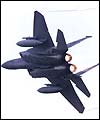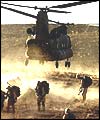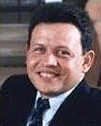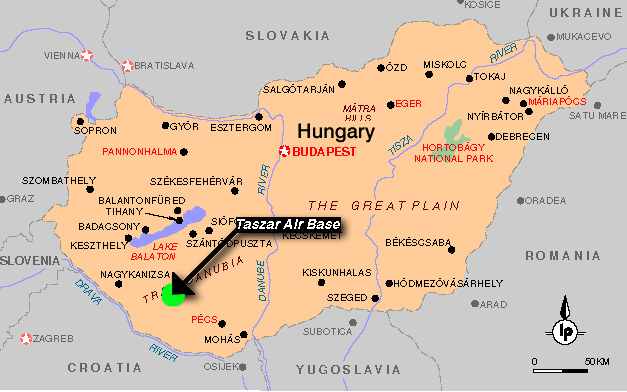
US-UK Air Might Knocks out Iraq’s Air Force-Air Defense Front Lines
DEBKAfile’s Military Sources http://directory.kol-israel.com/asites/? 8 September 2002: The importance of the massive US-UK air raid over Western Iraq Friday
night, September 6, cannot be exaggerated. Although the Bush administration is bidding hard
for broad international support for the US offensive against Saddam Hussein and his weapons
of mass destruction, DEBKAfile ’s military sources report that, since last month, a combined
American-British air blitz has been proceeding to systematically knock out the first line
of Iraq’s air force and air defenses.
This week, the limelight moves to New York, where President George W. Bush prepares to
address the UN General Assembly Thursday, September 12, the day after ceremonies marking
the anniversary of the terrorist atrocities that struck New York and Washington. He is
expected to give Saddam Hussein the option of accepting UN arms inspectors unconditionally
or facing action against him, as well as warning unsupportive governments that American will
go ahead on its own. Sunday, September 8, British prime minister Tony Blair, on his return
from seeing Bush at Camp David, declared “total determination” to deal with Iraq.
US and European diplomats in New York are working on a joint draft resolution to put before
the General Assembly, calling for a coercive UN inspection force to go into Iraq escorted
by an international military force and be given a deadline for establishing finally whether
or not Iraq has developed weapons of mass destruction. However, Iraqi spokesmen have already
rejected UN arms inspections without the lifting of sanctions, while Arab League Secretary
Amr Mussa, has declared the whole Arab world supports Iraq’s position. On Saturday, September
7, he said no Arab government would brook outside interference in Iraq, even by the world body.
The diplomatic flurry and the White House bid for support at home effectively post-date the
start of the US offensive against Iraq, which took place three months ago - not with a bang
but by cautious, prefatory steps. Unlike the softening-up air blitz against Afghanistan’s
Taliban and al Qaeda last year, US forces have been quietly filtering into Iraq (as DEBKAfile
informed its readers). To date, American and allied Turkish special forces have gained control
of some 15 percent of Iraqi soil – mostly in the north. They are poised at a point 10-15 miles
from Iraq’s two northern oil cities of Mosul andKirkuk, together with pro-American Kurdish and
Turkman paramilitary groups, with no Iraqi force in the way of their advance, if ordered to
occupy the two towns.
The massive US-UK air raid last Friday, September 6, by 100 fighter-bombers, reconnaissance
and air tanker craft against the Iraqi air base cluster known as H-3 and the al Baghdadi air
installation was Strike Number Two against the first line of Iraqi air and air defense command
structures, the tactical prelude to any US offensive. It was also the first blow to systems for
deliveringIraq’s weapons of mass destruction.
Strike Number One was carried out on August 5, when American and British bombers and fighter
craft demolished the Iraqi air command and control center at al-Nukhaib, in the desert between
Iraq and Saudi Arabia, 260 miles southwest of Baghdad. This strike disposed of Iraq’s southern
air defense line and left central Iraq including Baghdad vulnerable to US air, missile and
ground attack from Saudi Arabia,Kuwait, Qatar,Oman and Bahrain.
Strike Number two last week completed the destruction of Iraq’s air defenses in the west,
leaving the Saddam regime exposed to attack from the south, the southeast, the west and the
north, as well as a US troop presence actually inside northern Iraq.
DEBKAfile ’s military sources sum up American tactical gains in Iraq thus far:
A. Hitting the H-3, site of the bulk of the ground-ground-missile batteries and air defense
installations threatening Israeli, Jordan and US Eastern Mediterranean forces, as well as al
Baghdadi, cleared the way for US special forces to be flown by helicopter across the border
into Iraq from the West. Nothing now stops them from reaching as far as Tikrit, Saddam Hussein’s
tribal stronghold northwest of Baghdad, where the Iraqi ruler is believed to be hiding under-
ground with his family and top officials. There too he has concentrated the bulk of the loyal
units of the Iraqi army.
The first mission for the US units crossing in from Jordan will be, according to DEBKAfile’s
military sources, to capture the bombed air installations and prepare them quickly for the
use of US air force units and for more US and Jordanian special forces landings.
H-3 is designated their jumping off base for the next stage of the campaign.
8 September 2002: The importance of the massive US-UK air raid over Western Iraq Friday
night, September 6, cannot be exaggerated. Although the Bush administration is bidding hard
for broad international support for the US offensive against Saddam Hussein and his weapons
of mass destruction, DEBKAfile ’s military sources report that, since last month, a combined
American-British air blitz has been proceeding to systematically knock out the first line
of Iraq’s air force and air defenses.
This week, the limelight moves to New York, where President George W. Bush prepares to
address the UN General Assembly Thursday, September 12, the day after ceremonies marking
the anniversary of the terrorist atrocities that struck New York and Washington. He is
expected to give Saddam Hussein the option of accepting UN arms inspectors unconditionally
or facing action against him, as well as warning unsupportive governments that American will
go ahead on its own. Sunday, September 8, British prime minister Tony Blair, on his return
from seeing Bush at Camp David, declared “total determination” to deal with Iraq.
US and European diplomats in New York are working on a joint draft resolution to put before
the General Assembly, calling for a coercive UN inspection force to go into Iraq escorted
by an international military force and be given a deadline for establishing finally whether
or not Iraq has developed weapons of mass destruction. However, Iraqi spokesmen have already
rejected UN arms inspections without the lifting of sanctions, while Arab League Secretary
Amr Mussa, has declared the whole Arab world supports Iraq’s position. On Saturday, September
7, he said no Arab government would brook outside interference in Iraq, even by the world body.
The diplomatic flurry and the White House bid for support at home effectively post-date the
start of the US offensive against Iraq, which took place three months ago - not with a bang
but by cautious, prefatory steps. Unlike the softening-up air blitz against Afghanistan’s
Taliban and al Qaeda last year, US forces have been quietly filtering into Iraq (as DEBKAfile
informed its readers). To date, American and allied Turkish special forces have gained control
of some 15 percent of Iraqi soil – mostly in the north. They are poised at a point 10-15 miles
from Iraq’s two northern oil cities of Mosul andKirkuk, together with pro-American Kurdish and
Turkman paramilitary groups, with no Iraqi force in the way of their advance, if ordered to
occupy the two towns.
The massive US-UK air raid last Friday, September 6, by 100 fighter-bombers, reconnaissance
and air tanker craft against the Iraqi air base cluster known as H-3 and the al Baghdadi air
installation was Strike Number Two against the first line of Iraqi air and air defense command
structures, the tactical prelude to any US offensive. It was also the first blow to systems for
deliveringIraq’s weapons of mass destruction.
Strike Number One was carried out on August 5, when American and British bombers and fighter
craft demolished the Iraqi air command and control center at al-Nukhaib, in the desert between
Iraq and Saudi Arabia, 260 miles southwest of Baghdad. This strike disposed of Iraq’s southern
air defense line and left central Iraq including Baghdad vulnerable to US air, missile and
ground attack from Saudi Arabia,Kuwait, Qatar,Oman and Bahrain.
Strike Number two last week completed the destruction of Iraq’s air defenses in the west,
leaving the Saddam regime exposed to attack from the south, the southeast, the west and the
north, as well as a US troop presence actually inside northern Iraq.
DEBKAfile ’s military sources sum up American tactical gains in Iraq thus far:
A. Hitting the H-3, site of the bulk of the ground-ground-missile batteries and air defense
installations threatening Israeli, Jordan and US Eastern Mediterranean forces, as well as al
Baghdadi, cleared the way for US special forces to be flown by helicopter across the border
into Iraq from the West. Nothing now stops them from reaching as far as Tikrit, Saddam Hussein’s
tribal stronghold northwest of Baghdad, where the Iraqi ruler is believed to be hiding under-
ground with his family and top officials. There too he has concentrated the bulk of the loyal
units of the Iraqi army.
The first mission for the US units crossing in from Jordan will be, according to DEBKAfile’s
military sources, to capture the bombed air installations and prepare them quickly for the
use of US air force units and for more US and Jordanian special forces landings.
H-3 is designated their jumping off base for the next stage of the campaign.

Remarks added by the editor of BLUEPRINT magazine : - The original source of the above information is an Israeli agency (DEBKA, http://www.debka.com) cited by Radio Israel (KOL-ISRAEL, 09/09/02, http://directory.kol-israel.com). I checked the authenticity of that information which reached me via email. - It should be added that there was another, more recent attack of allied planes on Iraqi air defence (09/09/02) near Al-Amarah, 270 km southeast of Baghdad. [reported by DAILY TELEGRAPH, Surry Hills, Australia, 10/09/02] - For detailed information on Al-Udeid Air Base, important U.S. Air Force facility in Qatar that is presumed to play a decisive role in the attack on Iraq, click here ! It seems to be proven that Qatar air base has been provided with further tactical facilities (aircraft parking area and extended drive-in shelters) since the beginning of 2002. - As to the combined U.S.-Jordanian force, mentioned above (American tactical gains / section A and B.2.), here a report on Jordanian diplomacy that has been published by ARAB NEWS in Saudi Arabia (14/07/02):

Jordan firm on Iraqi stand
The Jordanian government said yesterday that the participation of Prince Hassan, uncle of King Abdallah, in a meeting of former Iraqi Army officers and opponents of Saddam Hussein in London will not change Amman’s stand that opposes the planned US attack on Iraq, Asharq Al-Awsat reported today. Jordan described the prince’s participation in the meeting as “a personal act.” Earlier, Prince Hassan said he was not in a position to comment on questions regarding the re-establishment of monarchy in Iraq. “I'm not a Jordanian government official,” he told reporters. Prince Hassan at the inaugural meeting of a conference in London picture: ASHARQ-AL-AWSAT, Riyadh (14/07/02) uniting Iraqi officers text: ARAB NEWS, Riyadh (14/07/02) who are opposing the regime of S. Hussein. King Abdallah II of Jordan in his interview conducted by the French magazine L'EXPRESS (20/06/02) on the possibility of a U.S. attack on Saddam's Iraq : "I made it clear to the U.S. what I think of such a possibility, and I think
of [France, Germany, Britain, Russia, Egypt] being on the same wavelength."
"Everybody is realizing that an attack of Iraq, namely in the present state
of crisis between Israel and Palestine, would have a devastating influence
on the the Middle East."
To understand the official Jordanian position and certain inofficial acti-
vities of the Royal Jordanian Family, it should be noted that Iraq had once
been reigned like Jordan by the Hashemite dynasty.
"I made it clear to the U.S. what I think of such a possibility, and I think
of [France, Germany, Britain, Russia, Egypt] being on the same wavelength."
"Everybody is realizing that an attack of Iraq, namely in the present state
of crisis between Israel and Palestine, would have a devastating influence
on the the Middle East."
To understand the official Jordanian position and certain inofficial acti-
vities of the Royal Jordanian Family, it should be noted that Iraq had once
been reigned like Jordan by the Hashemite dynasty.
- To understand the discrepancy between U.S. military plannings and official Jordanian policy, it is necessary to have a closer look at the U.S. way of dealing with their partners. As has already been proven in Chile and elsewhere, U.S. policy always relies on the establishment of excellent relations with their partner's mostly conservative military forces, yet following a different policy of appeasement and "treatment on the same level" with the official government or any other widely accepted political power. As to the U.S.-Jordanian relations, here an article published in July 2002 by the British paper THE GUARDIAN / THE OBSERVER (07/07/02):
US 'to attack Iraq via Jordan'
Military planners prepare to use British forces in an allied assault within months American military planners are preparing to use Jordan as a base for an assault on Iraq later this year or early in 2003, The Observer can reveal. Although leaked Pentagon documents appear to show that Turkey, Kuwait and the small Gulf state of Qatar would play key roles, it is believed that Jordan will be the 'jumping-off' point for an attack that could involve up to 250,000 American troops and forces from Britain and other key US allies. Jordan, with good roads and communications, would be perfect for the launch of an American armoured force, military analysts say. Its capital, Amman, is linked to Baghdad by a 600-mile motorway that cuts through a virtually featureless desert - perfect terrain for US tanks and high-precision air-launched munitions. Iraqi dissidents in Amman have told The Observer that hundreds of American advisers have arrived in Jordan in the past few months. The Amman-based Iraqi National Accord (INA), which contains many of the key military dissidents, has held talks in Washington about plans for a strike on Iraq. They expect the US to begin with intensive bomb- ing and missile raids launched from the Gulf and Turkey, leading to a military rebellion within Saddam Hussein's elite Republican Guard. The INA, they say, could play a military role from Jordan. They envisage a military coup, leading to transitional military rule. Eye-witnesses claim preparations are under way at the Muafaq Salti air base in Azraq, 50 miles east of Amman on the road to Baghdad. Ten days ago the Jordanian news agency, Petra, reported that the head of the US Central Command, General Tommy Franks, met Jordan's chairman of the Joint Chiefs of Staff, Lieutenant-General Khalid Jamil Surayrih. The agency said 'the two sides reviewed the general situation in the region and areas of co-operation between Jordanian and US armed forces...' Officially, Jordan is opposed to a war on Iraq, but informed sources said that there is a tacit agreement on the issue between the Jordanian government and Washington. The US has apparently given Jordan and other Arab states the freedom to pay lip-service to support for Iraq. News of a military build-up coincides with a US attempt to wean Jordan from its deep economic ties with Iraq, and some observers see a growing military role for Jordan in the country once ruled by its Hashemite royal family. 'Jordan's role will be that of Pakistan in the US-Taliban war,' said a prominent Jordanian analyst. Jordan's economy is inter-woven into Iraq's, and the kingdom shares a close military and economic alliance with the US. Others say Jordan will pay a heavy price for co-operating with an attack. 'A US strike against Iraq will increase the influence of radicals [in Jordan],' said former Prime Minister Taher al-Masri. 'The feeling that the US is an enemy will be enhanced.' Although Marwan Moasher, the Jordanian Foreign Minister, denied the presence of any American troops in his country, government sources confirmed that major manoeuvres involving the American and Jordanian forces took place in March. Moasher issued denials after the Lebanese daily Al Safir reported that 2,000 American forces in Jordan are preparing to carry out military operations against Iraq. Observers point out that President George Bush has met King Abdullah of Jordan at least five times since taking office. The US is expected to double its aid to Jordan to $500m next year, and Congress is now considering a request by the administration to increase it by another $100m. The American planners now believe only military force can remove Saddam from power. Earlier this year American intelligence operatives were sent to northern Iraq to gather information on Iraqi defences and gauge the fighting capability of the Kurdish militias. The Americans reconnoitred Iraqi frontline positions and requested maps of minefields from demining agencies working in the area. They decided the Kurds would be no match for the Republican Guard. Some elements in the US administration still hope that disaffected military officers in Iraq can stage a coup. Next week about 70 former Iraqi officers will gather in London for the biggest dissidents' meeting yet to discuss the overthrow of the Iraqi President. The US hopes some of them retain links with brother officers still in Iraq. The conference is being organised by a former brigadier, Tawfiq al-Yassiri, who took part in an uprising in the Babylon region south of Baghdad at the end of the Gulf war. The co-organiser of the conference is a former general, Saad Ubeidi, who was the Iraqi army's head of psychological operations. The three-day conference will discuss ways of mobilising military efforts in support of political opposition to Saddam. THE GUARDIAN / THE OBSERVER (07/07/02)- As CHICAGO TRIBUNE (20/01/03) and LE MONDE, Paris (22/01/03) reported, Iraqi exiles are trained in the remote Hungarian military camp of Taszar. I found two links that might give an idea of that tiny U.S. base : Taszar Air Base (general site description) Staging Area Operations in Taszar, Hungary: Operation Joint Endeavor
